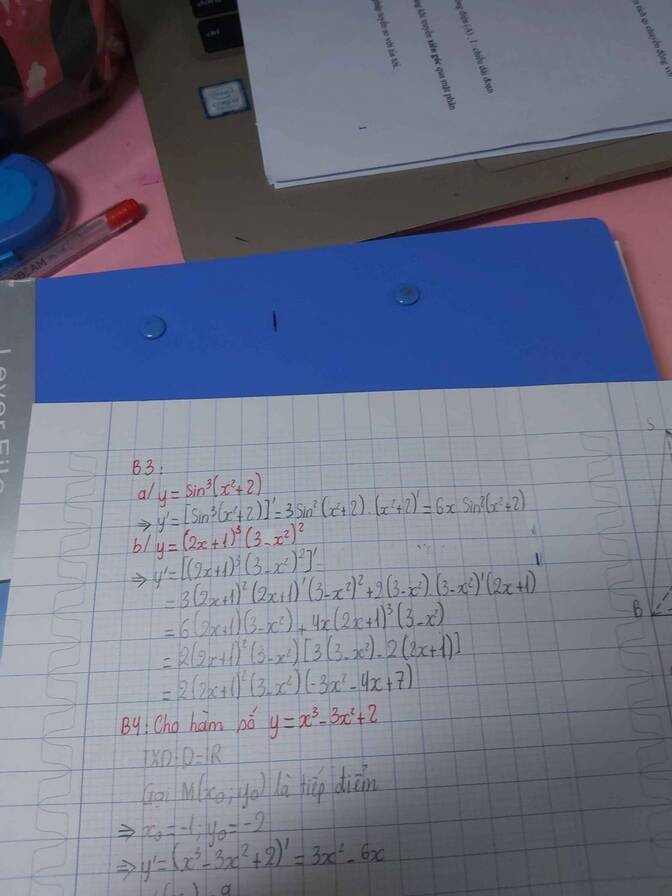Tính đạo hàm của các hàm số sau: (2 điểm)
a. $y={{\sin }^{3}}\left( {{x}^{2}}+2 \right)$;
b. $y={{\left( 2x+1 \right)}^{3}}{{\left( 3-{{x}^{2}} \right)}^{2}}$.
Hãy nhập câu hỏi của bạn vào đây, nếu là tài khoản VIP, bạn sẽ được ưu tiên trả lời.

a) Đặt \(u = 3{\rm{x}}\) thì \(y = \sin u\). Ta có: \(u{'_x} = {\left( {3{\rm{x}}} \right)^\prime } = 3\) và \(y{'_u} = {\left( {\sin u} \right)^\prime } = \cos u\).
Suy ra \(y{'_x} = y{'_u}.u{'_x} = \cos u.3 = 3\cos 3{\rm{x}}\).
Vậy \(y' = 3\cos 3{\rm{x}}\).
b) Đặt \(u = \cos 2{\rm{x}}\) thì \(y = {u^3}\). Ta có: \(u{'_x} = {\left( {\cos 2{\rm{x}}} \right)^\prime } = - 2\sin 2{\rm{x}}\) và \(y{'_u} = {\left( {{u^3}} \right)^\prime } = 3{u^2}\).
Suy ra \(y{'_x} = y{'_u}.u{'_x} = 3{u^2}.\left( { - 2\sin 2{\rm{x}}} \right) = 3{\left( {\cos 2{\rm{x}}} \right)^2}.\left( { - 2\sin 2{\rm{x}}} \right) = - 6\sin 2{\rm{x}}{\cos ^2}2{\rm{x}}\).
Vậy \(y' = - 6\sin 2{\rm{x}}{\cos ^2}2{\rm{x}}\).
c) Đặt \(u = \tan {\rm{x}}\) thì \(y = {u^2}\). Ta có: \(u{'_x} = {\left( {\tan {\rm{x}}} \right)^\prime } = \frac{1}{{{{\cos }^2}x}}\) và \(y{'_u} = {\left( {{u^2}} \right)^\prime } = 2u\).
Suy ra \(y{'_x} = y{'_u}.u{'_x} = 2u.\frac{1}{{{{\cos }^2}x}} = 2\tan x\left( {{{\tan }^2}x + 1} \right)\).
Vậy \(y' = 2\tan x\left( {{{\tan }^2}x + 1} \right)\).
d) Đặt \(u = 4 - {x^2}\) thì \(y = \cot u\). Ta có: \(u{'_x} = {\left( {4 - {x^2}} \right)^\prime } = - 2{\rm{x}}\) và \(y{'_u} = {\left( {\cot u} \right)^\prime } = - \frac{1}{{{{\sin }^2}u}}\).
Suy ra \(y{'_x} = y{'_u}.u{'_x} = - \frac{1}{{{{\sin }^2}u}}.\left( { - 2{\rm{x}}} \right) = \frac{{2{\rm{x}}}}{{{{\sin }^2}\left( {4 - {x^2}} \right)}}\).
Vậy \(y' = \frac{{2{\rm{x}}}}{{{{\sin }^2}\left( {4 - {x^2}} \right)}}\).

a) \(g'\left( x \right) = y' = {\left( {2x + \frac{\pi }{4}} \right)^,}.\cos \left( {2x + \frac{\pi }{4}} \right) = 2\cos \left( {2x + \frac{\pi }{4}} \right)\)
b) \(g'\left( x \right) = - 2{\left( {2x + \frac{\pi }{4}} \right)^,}.\sin \left( {2x + \frac{\pi }{4}} \right) = - 4\sin \left( {2x + \frac{\pi }{4}} \right)\)

a) Cách 1: Ta có:
y' = 6sin5x.cosx - 6cos5x.sinx + 6sinx.cos3x - 6sin3x.cosx = 6sin3x.cosx(sin2x - 1) + 6sinx.cos3x(1 - cos2x) = - 6sin3x.cos3x + 6sin3x.cos3x = 0.
Vậy y' = 0 với mọi x, tức là y' không phụ thuộc vào x.
Cách 2:
y = sin6x + cos6x + 3sin2x.cos2x(sin2x + cos2x) = sin6x + 3sin4x.cos2x + 3sin2x.cos4x + cos6x = (sin2x + cos2x)3 = 1
Do đó, y' = 0.
b) Cách 1:
Áp dụng công thức tính đạo hàm của hàm số hợp
(cos2u)' = 2cosu(-sinu).u' = -u'.sin2u
Ta được
y' =[sin - sin
] + [sin
- sin
] - 2sin2x = 2cos
.sin(-2x) + 2cos
.sin(-2x) - 2sin2x = sin2x + sin2x - 2sin2x = 0,
vì cos = cos
=
.
Vậy y' = 0 với mọi x, do đó y' không phụ thuộc vào x.
Cách 2: vì côsin của hai cung bù nhau thì đối nhau cho nên
cos2 = cos2
'
cos2 = cos2
.
Do đó
y = 2 cos2 + 2cos2
- 2sin2x = 1 +cos
+ 1 +cos
- (1 - cos2x) = 1 +cos
+ cos
+ cos2x = 1 + 2cos
.cos(-2x) + cos2x = 1 + 2
cos2x + cos2x = 1.
Do đó y' = 0.

tham khảo:
a)\(y'\left(x\right)=5\left(\dfrac{2x-1}{x+2}\right)^4.\dfrac{\left(x+2\right)\left(2\right)-\left(2x-1\right).1}{\left(x+2\right)^2}\)
\(=\dfrac{10\left(2x-1\right)\left(x+2\right)^3}{\left(x+2\right)^4}=\dfrac{20x-50}{\left(x+2\right)^4}\)
b)\(y'\left(x\right)=\dfrac{2\left(x^2+1\right)-2x\left(2x\right)}{\left(x^2+1\right)^2}\)\(=\dfrac{2\left(1-x^2\right)}{\left(x^2+1\right)^2}\)
c)\(y'\left(x\right)=e^x.2sinxcosx+e^xsin^2x.2cosx\)
\(=2e^xsinx\left(cosx+sinxcosx\right)\)
\(=2e^xsinxcos^2x\)
d)\(y'\left(x\right)=\dfrac{1}{x\sqrt{x}}.\left(+\dfrac{1}{2\sqrt{x}}\right)\)
\(=\dfrac{1}{\sqrt{x}\left(2\sqrt{x}+\sqrt{x}+2\right)}\)
\(=\dfrac{1}{\sqrt{x}\left(3\sqrt{x}+2\right)}\)

a: \(y'=\left[tan\left(e^x+1\right)\right]'=\dfrac{\left(e^x+1\right)'}{cos^2\left(e^x+1\right)}=\dfrac{e^x}{cos^2\left(e^x+1\right)}\)
b: \(y'=\left(\sqrt{sin3x}\right)'\)
\(=\dfrac{\left(sin3x\right)'}{2\sqrt{sin3x}}=\dfrac{3\cdot cos3x}{2\sqrt{sin3x}}\)
c: \(y=cot\left(1-2^x\right)\)
=>\(y'=\left[cot\left(1-2^x\right)\right]'\)
\(=\dfrac{-2}{sin^2\left(1-2^x\right)}\cdot\left(-2^x\cdot ln2\right)\)
\(=\dfrac{2^{x+1}\cdot ln2}{sin^2\left(1-2^x\right)}\)

\(y'=\left(cosx\right)'\\ =\left(\dfrac{\pi}{2}-x\right)'cos\left(\dfrac{\pi}{2}-x\right)\\ =-cos\left(\dfrac{\pi}{2}-x\right)\\ =-sinx\)

a) Với \({x_0}\) bất kì, ta có:
\(\begin{array}{l}f'\left( {{x_0}} \right) = \mathop {\lim }\limits_{x \to {x_0}} \frac{{f\left( x \right) - f\left( {{x_0}} \right)}}{{x - {x_0}}} = \mathop {\lim }\limits_{x \to {x_0}} \frac{{{x^3} + {x^2} - x_0^3 - x_0^2}}{{x - {x_0}}}\\ = \mathop {\lim }\limits_{x \to {x_0}} \frac{{\left( {x - {x_0}} \right)\left( {{x^2} + x{x_0} + x_0^2} \right) + \left( {x - {x_0}} \right)\left( {x + {x_0}} \right)}}{{x - {x_0}}} = \mathop {\lim }\limits_{x \to {x_0}} \frac{{\left( {x - {x_0}} \right)\left( {{x^2} + x{x_0} + x_0^2 + x + {x_0}} \right)}}{{x - {x_0}}}\\ = \mathop {\lim }\limits_{x \to {x_0}} \left( {{x^2} + x{x_0} + x_0^2 + x + {x_0}} \right) = 3x_0^2 + 2{x_0}\end{array}\)
Vậy hàm số \(y = {x^3} + {x^2}\) có đạo hàm là hàm số \(y' = 3{x^2} + 2x\)
b) \({\left( {{x^3}} \right)^,} + {\left( {{x^2}} \right)^,} = 3{x^2} + 2x\)
Do đó \(\left( {{x^3} + {x^2}} \right)'\) = \(\left( {{x^3}} \right)' + \left( {{x^2}} \right)'.\)

a: \(y'=\left(x^2+2x\right)'\left(x^3-3x\right)+\left(x^2+2x\right)\left(x^3-3x\right)'\)
\(=\left(2x+2\right)\left(x^3-3x\right)+\left(x^2+2x\right)\left(3x^2-3\right)\)
\(=2x^4-6x^2+2x^3-6x+3x^4-3x^2+6x^3-6x\)
\(=5x^4+8x^3-9x^2-12x\)
b: y=1/-2x+5
=>\(y'=\dfrac{2}{\left(2x+5\right)^2}\)
c: \(y'=\dfrac{\left(4x+5\right)'}{2\sqrt{4x+5}}=\dfrac{4}{2\sqrt{4x+5}}=\dfrac{2}{\sqrt{4x+5}}\)
d: \(y'=\left(sinx\right)'\cdot cosx+\left(sinx\right)\cdot\left(cosx\right)'\)
\(=cos^2x-sin^2x=cos2x\)
e: \(y=x\cdot e^x\)
=>\(y'=e^x+x\cdot e^x\)
f: \(y=ln^2x\)
=>\(y'=\dfrac{\left(-1\right)}{x^2}=-\dfrac{1}{x^2}\)

a, \(y=\left(2x^3+3\right)^2\)
\(y'=2\left(2x^3+3\right)6x^2\)
\(=12x^2\left(2x^3+3\right)\)
b,\(y=cos3x\)
\(y'=-3sin3x\)
c, \(y=log_2\left(x^2+2\right)\)
\(y'=\dfrac{2x}{\left(x^2+2\right)ln2}\)
Võ Ngọc Tú Uyên